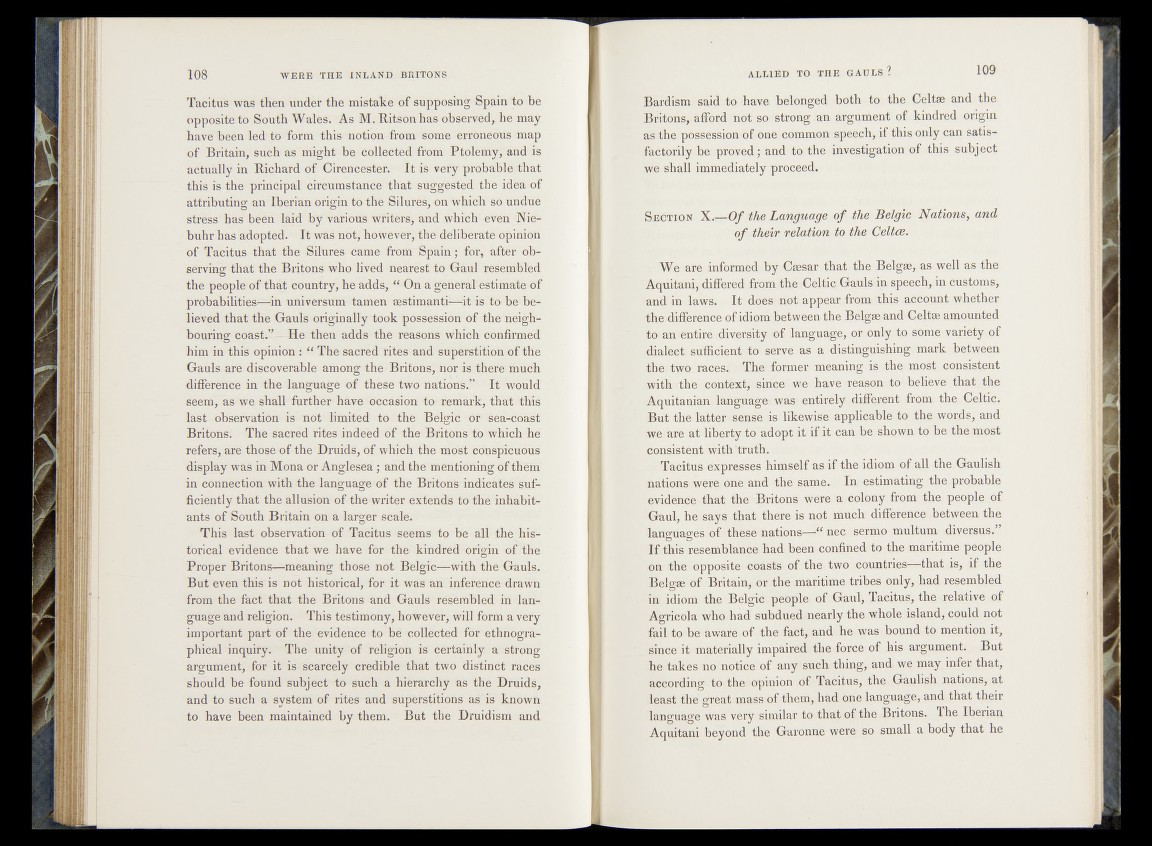
Tacitus was then under the mistake of supposing Spain to be
opposite.to South Wales. 'As M.RitSonhas observed,-he may
have héén led to form this notion-from some erroneous map
of Britain, such as might be collected from Ptolemy, and is
actually in Richard of Cirencester. It is very probable’ that
this is the principal circumstance that suggested theddëa»of
attributing an Iberian origin to thé Silures,-on which so: undue
stress has been laid by various writers, and which eveh "Niebuhr
has adopted. It was not,^however, the deliberate opinion
of Tacitus that the Silures came from Spain; for, after observing
that the Britons who lived nearest to Gaul resembled
the people of th a | country, he adds, “ On a general estimate of
probabilities'—in universum tarnen aestimanti-^it is to-bo believed
that the Gauls Originally took possession of the neighbouring
eoast?t^-He then adds the reasons which confirmed
him in this opinion : “ The saorectTites and su p e rstitie of thfg
Gauls are discoverable among-the Britons, nor is.€frefMfó|fÉi
difference in the language of these two nation's?’'- It ^would
seem, as we shall further have occasion to remark,' that iMs
last observation is not limited to the BelgicNOr sea-cbaSt
BritonS: The sacred rites indeed of the Britons *to WhfcffhC
refers, are those of the Druids, of which the most conspicuous
display was in Mona or Anglesea; and the mentioning óf them?1
in connection with the language of the Britons~indiearteSt:suf-
ficiently that the allusion of the writer extends to the inhabitants
of South Britain on a larger scale.
This last observation of Tacitus seems to be all the historical
evidence th at we have for the kindred'origin of The
Proper Britons—meaning those not Belgic—with the Gauls.
But even this is not historical, for i t was an inference- drawn
from the fact that the Britons and Gauls resembled in language
and religion. This testimony, however, will form a very
important part of the evidence to be collected for ethnographical
inquiry# "'IfteMinity of religion is certainly a strong
argument,-: for it is scarcely credible that two distinct races
should- be found subject to such a hierarchy as the Druids,
and to such a system of rites and superstitions as“ is known
to have been maintained by them. But the Druidism and
Bardisjth said to have, belonged both to the Celtse and the
Bntons, afford not so strong an argument ©JUdndred origin
^gethe .possession of One.',common speech, if this, only can satisfactorily
b e 'pf ©,vedjtvand to; the investigation of this su b je ct
we shall immediately proceed.
Section X.—Of'ihe Language..of the Belgjia Nations, and
of their relation% to. the Qettce. 1
We.are informed by5 Cäesar that,the Belgae, as well a.s the
Aquitanbdiffered from the ^Celtic Gauls' in speech, in custpms,
-and in laws. I a p p e a r from this account whether
-the difference of jdi ombetween the Belgae and Celtse amounted
to jan senfifeff iver(sity/|P'fi ;lalngiiage, oryonlpitp. son|%? variety- of
iffialecffäifficient' t|$s&we< as a distinguishing* mark, between
the two jap e s'# ' The former- meaning -is- the, most/consistent
with the context, spice we have reason to believe that , the
Aquitanian language; was ent&ei^diffexent,Jftom the^Celtie,
But thei-Mtter * sense is likewise applicable to the worlds, and
we are atffibertyjtb adopt itiif:it can*ble vshown to be the most
(Consistent with'truth.,
l^jTaieitus!«.expresses himself as if the id iom s , all the Gaulish
nations were ohie and the same. In estimating thef.pi’ohable
evidence that the Britons were a colony from the, people of
Gaul, he says that there, is not much differenceijbetween the
languages off these n a tio n s ^ / .multum diversus.”
If this resemblance had been confined to the maritime^people
on the opposite coasts of the two countries—that :js,< j f the
Belgae of Britain, or the maritime tribes only, had resembled
in idiom the Belgic people of Gaul, Tacitus', the relative of
Agricola who had subdued nearly the whole island, not
fail to be aware of the fact, and he was bound to mention it,
since it materially impaired the force of| his argument. But
he takes no notice of any such thing, and we may infer that,
according to the1 opinion of Tacitus,1,th e , Gaulish nations, at
least the great mass of them, had one language, and that their
language was very, similar to that of the Britons.; The Iberian
Aquitani beyond the Garonne were so small a body that he